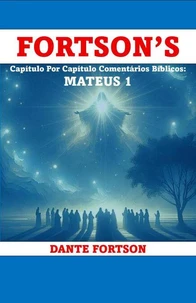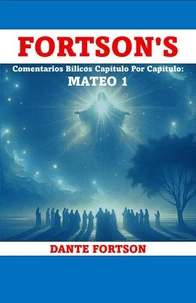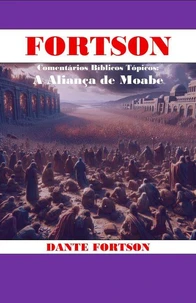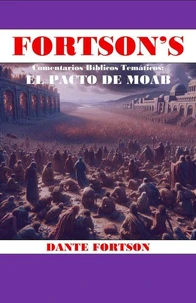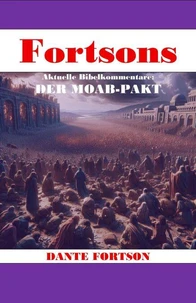Chapter by Chapter Bible Commentaries: Revelation 1. Fortson’s Chapter by Chapter Bible Commentaries
Par :Formats :
Disponible dans votre compte client Decitre ou Furet du Nord dès validation de votre commande. Le format ePub est :
- Compatible avec une lecture sur My Vivlio (smartphone, tablette, ordinateur)
- Compatible avec une lecture sur liseuses Vivlio
- Pour les liseuses autres que Vivlio, vous devez utiliser le logiciel Adobe Digital Edition. Non compatible avec la lecture sur les liseuses Kindle, Remarkable et Sony
 , qui est-ce ?
, qui est-ce ?Notre partenaire de plateforme de lecture numérique où vous retrouverez l'ensemble de vos ebooks gratuitement
Pour en savoir plus sur nos ebooks, consultez notre aide en ligne ici
- FormatePub
- ISBN8232033163
- EAN9798232033163
- Date de parution23/09/2025
- Protection num.pas de protection
- Infos supplémentairesepub
- ÉditeurHamza elmir
Résumé
Revelation 1 serves as the powerful prologue to the Book of Revelation, framing it not as a puzzle, but as the direct revelation of Jesus Christ. Writing from his exile on the island of Patmos, the apostle John records his dramatic vision of the glorified and resurrected Christ, an awe-inspiring figure with eyes like blazing fire and a voice like rushing waters. The chapter emphasizes key themes of divine authority, as Jesus reveals himself as the Alpha and Omega, the one who holds the keys of Hell and death.
This opening vision is communicated specifically to seven churches in Asia, which are represented by seven golden lampstands among which Jesus walks, signifying his active and sovereign presence with his people. Throughout this introduction, the text assures believers that Jesus is the faithful witness and the ruler over the kings of the earth, providing both a promise of hope for the faithful and a sobering warning of his ultimate judgment.
Ultimately, Revelation 1 invites the reader into the heart of prophecy, assuring them of Christ's victory over suffering and death and his ultimate return. Date: c 68 - 69 AD (view 1) or c 95 - 96 AD (view 2)Writer: JohnCompositionRevelation 1 is broken down into two major parts, both of which are focused on Christ and his revelation.· John documents everything he saw and heard.· Christ introduces himself and instructs John to write.
ViewpointsMost popular viewpoints on Revelation 1 tend to focus on the significance of the opening vision, which serves as a foundational introduction to the entire book. Interpretations often include viewing the vision as a symbolic portrayal of the glorified, resurrected Christ who is intimately involved with his church, represented by the golden lampstands. Many also emphasize the declaration of Christ as "the Alpha and the Omega, " which affirms his divine sovereignty and eternal nature.
The message is often seen as a source of comfort and encouragement to believers facing persecution, reminding them that their king is all-powerful and in control. Finally, a popular viewpoint, particularly within the futurist eschatological framework, is to see the chapter's command to write about "the things which you have seen, and the things which are, and the things which will take place after this, " as an outline for the rest of Revelation. ImportanceRevelation 1 sets the stage for the rest of the Bible by revealing Jesus in his full power and glory, emphasizing his ultimate victory and control over all of history.
It ties together all the major themes of scripture like creation, sin, and redemption; and shows how they lead to his final triumph over evil. Essentially, Revelation 1 reminds readers that even though the world seems chaotic and full of struggle, God has a plan, Christ is in charge, and everything is going to be alright in the end.
This opening vision is communicated specifically to seven churches in Asia, which are represented by seven golden lampstands among which Jesus walks, signifying his active and sovereign presence with his people. Throughout this introduction, the text assures believers that Jesus is the faithful witness and the ruler over the kings of the earth, providing both a promise of hope for the faithful and a sobering warning of his ultimate judgment.
Ultimately, Revelation 1 invites the reader into the heart of prophecy, assuring them of Christ's victory over suffering and death and his ultimate return. Date: c 68 - 69 AD (view 1) or c 95 - 96 AD (view 2)Writer: JohnCompositionRevelation 1 is broken down into two major parts, both of which are focused on Christ and his revelation.· John documents everything he saw and heard.· Christ introduces himself and instructs John to write.
ViewpointsMost popular viewpoints on Revelation 1 tend to focus on the significance of the opening vision, which serves as a foundational introduction to the entire book. Interpretations often include viewing the vision as a symbolic portrayal of the glorified, resurrected Christ who is intimately involved with his church, represented by the golden lampstands. Many also emphasize the declaration of Christ as "the Alpha and the Omega, " which affirms his divine sovereignty and eternal nature.
The message is often seen as a source of comfort and encouragement to believers facing persecution, reminding them that their king is all-powerful and in control. Finally, a popular viewpoint, particularly within the futurist eschatological framework, is to see the chapter's command to write about "the things which you have seen, and the things which are, and the things which will take place after this, " as an outline for the rest of Revelation. ImportanceRevelation 1 sets the stage for the rest of the Bible by revealing Jesus in his full power and glory, emphasizing his ultimate victory and control over all of history.
It ties together all the major themes of scripture like creation, sin, and redemption; and shows how they lead to his final triumph over evil. Essentially, Revelation 1 reminds readers that even though the world seems chaotic and full of struggle, God has a plan, Christ is in charge, and everything is going to be alright in the end.
Revelation 1 serves as the powerful prologue to the Book of Revelation, framing it not as a puzzle, but as the direct revelation of Jesus Christ. Writing from his exile on the island of Patmos, the apostle John records his dramatic vision of the glorified and resurrected Christ, an awe-inspiring figure with eyes like blazing fire and a voice like rushing waters. The chapter emphasizes key themes of divine authority, as Jesus reveals himself as the Alpha and Omega, the one who holds the keys of Hell and death.
This opening vision is communicated specifically to seven churches in Asia, which are represented by seven golden lampstands among which Jesus walks, signifying his active and sovereign presence with his people. Throughout this introduction, the text assures believers that Jesus is the faithful witness and the ruler over the kings of the earth, providing both a promise of hope for the faithful and a sobering warning of his ultimate judgment.
Ultimately, Revelation 1 invites the reader into the heart of prophecy, assuring them of Christ's victory over suffering and death and his ultimate return. Date: c 68 - 69 AD (view 1) or c 95 - 96 AD (view 2)Writer: JohnCompositionRevelation 1 is broken down into two major parts, both of which are focused on Christ and his revelation.· John documents everything he saw and heard.· Christ introduces himself and instructs John to write.
ViewpointsMost popular viewpoints on Revelation 1 tend to focus on the significance of the opening vision, which serves as a foundational introduction to the entire book. Interpretations often include viewing the vision as a symbolic portrayal of the glorified, resurrected Christ who is intimately involved with his church, represented by the golden lampstands. Many also emphasize the declaration of Christ as "the Alpha and the Omega, " which affirms his divine sovereignty and eternal nature.
The message is often seen as a source of comfort and encouragement to believers facing persecution, reminding them that their king is all-powerful and in control. Finally, a popular viewpoint, particularly within the futurist eschatological framework, is to see the chapter's command to write about "the things which you have seen, and the things which are, and the things which will take place after this, " as an outline for the rest of Revelation. ImportanceRevelation 1 sets the stage for the rest of the Bible by revealing Jesus in his full power and glory, emphasizing his ultimate victory and control over all of history.
It ties together all the major themes of scripture like creation, sin, and redemption; and shows how they lead to his final triumph over evil. Essentially, Revelation 1 reminds readers that even though the world seems chaotic and full of struggle, God has a plan, Christ is in charge, and everything is going to be alright in the end.
This opening vision is communicated specifically to seven churches in Asia, which are represented by seven golden lampstands among which Jesus walks, signifying his active and sovereign presence with his people. Throughout this introduction, the text assures believers that Jesus is the faithful witness and the ruler over the kings of the earth, providing both a promise of hope for the faithful and a sobering warning of his ultimate judgment.
Ultimately, Revelation 1 invites the reader into the heart of prophecy, assuring them of Christ's victory over suffering and death and his ultimate return. Date: c 68 - 69 AD (view 1) or c 95 - 96 AD (view 2)Writer: JohnCompositionRevelation 1 is broken down into two major parts, both of which are focused on Christ and his revelation.· John documents everything he saw and heard.· Christ introduces himself and instructs John to write.
ViewpointsMost popular viewpoints on Revelation 1 tend to focus on the significance of the opening vision, which serves as a foundational introduction to the entire book. Interpretations often include viewing the vision as a symbolic portrayal of the glorified, resurrected Christ who is intimately involved with his church, represented by the golden lampstands. Many also emphasize the declaration of Christ as "the Alpha and the Omega, " which affirms his divine sovereignty and eternal nature.
The message is often seen as a source of comfort and encouragement to believers facing persecution, reminding them that their king is all-powerful and in control. Finally, a popular viewpoint, particularly within the futurist eschatological framework, is to see the chapter's command to write about "the things which you have seen, and the things which are, and the things which will take place after this, " as an outline for the rest of Revelation. ImportanceRevelation 1 sets the stage for the rest of the Bible by revealing Jesus in his full power and glory, emphasizing his ultimate victory and control over all of history.
It ties together all the major themes of scripture like creation, sin, and redemption; and shows how they lead to his final triumph over evil. Essentially, Revelation 1 reminds readers that even though the world seems chaotic and full of struggle, God has a plan, Christ is in charge, and everything is going to be alright in the end.










